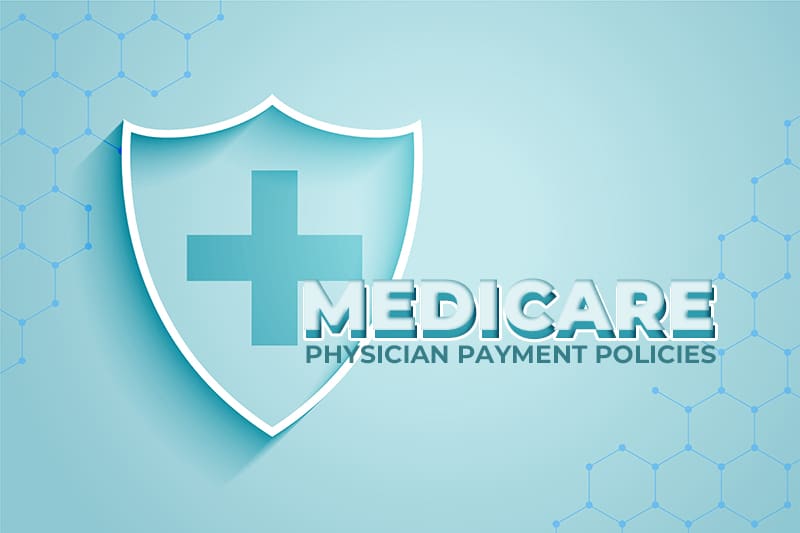The Medicare Physician Fee Schedule (PFS) final rule released annually by the Centers for Medicare and Medicaid (CMS) updates the standards for physician reimbursement and policies related to health care services. While these updates address Medicare medical billing requirements, they also serve as standards for payment rates and coverage policies of Medicaid programs and private insurers. The 2023 Medicare Physician Fee Schedule (MPFS) and Quality Payment Program final rule that was released November 1, 2022, became effective January 1, 2023. Discussed below are the Medicare payment policies that will impact practitioners and medical billing companies in 2023:
Evaluation and Management (E/M) Visits
There are significant changes in coding, documentation and payment for evaluation and management (“E/M”) visits:
- Elimination of the use of history and physical exam to determine the code level. Instead, code selection depends on a medically appropriate history and physical exam.
- New descriptor times
- Revised interpretive guidelines for levels of medical decision-making
- Choice between medical decision making or time to select code levels
- Medicare-specific coding for payment of “Other E/M” prolonged services reported with 3 new G-codes: G0316, G0317, and G0318. for hospitals, nursing facilities, and home visits. These G-codes replace CPT codes 99356 (Prolonged service in the inpatient or observation setting), and 99357 (Prolonged service in the inpatient or observation setting).
Physicians can bill for the services if they perform a substantive portion of the encounter. In 2023, selection of the billing practitioner will be based on either (a) who provided the history, physical exam, or medical decision-making (MDM); or (b) who spent more than half of the total time on the service. CMS has extended this phase-in approach of defining “substantive portion” as more than half the time of the visit to CY 2024.
An article from the American Academy of Family Physicians lists other CPT changes that impact how office/outpatient E/M services are reported in 2023:
- Hospital inpatient and observation codes have been brought under a single family of codes: 99221-99223 and 99231-99233;
- The lowest level emergency department code (99281) has been redefined to describe visits that may not require the presence of a physician or other qualified health care professional;
- The nursing home annual exam has been deleted and this service will now be coded as a subsequent nursing home visit (99307-99310)
- The “Domiciliary, Rest Home (e.g., Boarding Home), or Custodial Care Services” and “Home Services” E/M visit families have merged into a single code family titled “Home or Residence Services.”
Telehealth Visits
Certain services added during COVID-19 to the Medicare telehealth covered services list, including telephone visits, will remain on the list for 151 days after the expiration of the public health emergency (PHE). The following policies will also remain in place during the PHE for 151 days after the PHE ends:
- Allowing telehealth services to be furnished in any geographic area and in any originating site setting (including the beneficiary’s home)
- Allowing certain services to be provided via audio-only telecommunications systems
- Allowing physical therapists, occupational therapists, speech-language pathologists, and audiologists to provide telehealth services
Behavioral Health and Substance Abuse
In the 2023 MPFS final rule, CMS said it “is strengthening access to vital behavioral health services”. An exception has been added to the direct supervision requirement that allows behavioral health services or supplies furnished by auxiliary personnel (licensed professional counselors and licensed marriage and family therapists) to be provided on an incident-to basis under the general supervision of a physician or non-physician practitioner (“NPP”). This includes services furnished primarily for the diagnosis and treatment of a mental health or substance use disorder.
Payment will be provided for opioid treatment programs (OTPs) that use telehealth with patients to initiate treatment with buprenorphine. OTPs can also bill for opioid use disorder treatment services provided through mobile units, so long as services are performed in accordance with SAMHSA and DEA guidance.
Chronic Pain Management (CPM) Services
CMS has introduced separate coding and payment for chronic pain management (CPM) services separate coding and payment for chronic pain management services: There are new HCPCS codes to report chronic pain management and treatment that encompass holistic chronic pain care services, including assessment and monitoring; administration of a validated pain rating scale or tool; and development, implementation, revision, and/or maintenance of a person-centered care plan that includes strengths, goals, clinical needs, desired outcomes, and overall treatment management.
CPM bundled payment takes into account the time and resources involved in furnishing comprehensive CPM services. HCPCS Level II codes G3002 and G3003 for CPM include diagnosis; assessment and monitoring; administration of a validated pain rating scale or tool. Billing for these codes must be consistent with the service as specified in the code descriptors. For HCPCS Code G3002, the initial visit must be in person where both individuals are in a clinical setting such as a primary care practitioner’s office or another applicable setting.
CPM services can be billed by a physician, nurse practitioner, physician assistant, or eligible qualified health care professional. There are no defined requirements for an established history or diagnosis of chronic pain, but the patient must be experiencing persistent or recurrent pain lasting longer than 3 months.
Audiology Services
The final rule also allows direct access to an audiologist without an order from a physician or QHP for non-acute hearing conditions unrelated to disequilibrium, hearing aids, or examinations for the purpose of prescribing, fitting, or changing hearing aids. There are new CPT codes for 2023:
98978 Remote therapeutic monitoring (eg, therapy adherence, therapy response); device(s) supply with scheduled (eg, daily) recording(s) and/or programmed alert(s) transmission to monitor cognitive behavioral therapy, each 30 days
Category III CPT codes related to vestibular implant programming and reprogramming
0728T Diagnostic analysis of vestibular implant, unilateral; with initial programming
0729T with subsequent programming
There are also new CPT codes for cochlear implant programming and reprogramming in 2023.
Medicare Payment Updates
- The 2023 MIPS performance threshold will remain at 75 points, with eligible clinicians receiving payment increases or reductions of up to 9% on their Medicare Part B claims. There is no exceptional performance threshold in 2023.
- The conversion factor has gone down in 2023 when compared to 2022. The conversion rate, which was $34.61 in 2022, is $33.06 in 2023.
- The PFS also includes dental coverage when opted for before organ transplants and other major services.
- For cardiologists, CMS estimated that the rule will decrease payments by 1% compared with 2022.
Outsource Medical Billing to Handle the Changes
With the significant impacts the Medicare PFS will have not medical billing and coding, providers need to be well prepared to handle these updates. Partnering with a professional medical billing and coding company is the best way for practices to update the new fee schedule in their systems and bill correctly for their services and keep their bottom line intact.




